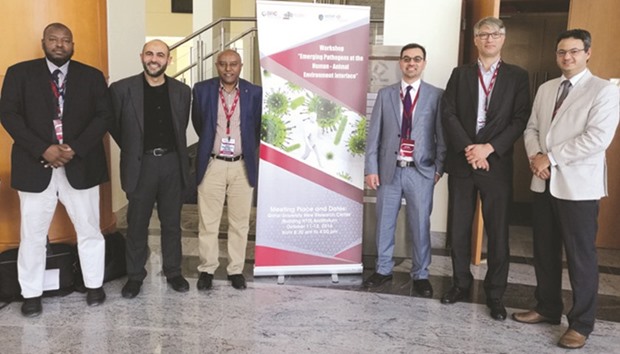Qatar University Biomedical Research Centre (QU-BRC) hosted a workshop on “Emerging Pathogens at the Human-Animal-Environment
Interface”.
The event, which was supported by Qatar National Research Fund (QNRF), aimed to share latest scientific research findings and One Health training and outreach model systems against Emerging Infectious Diseases (EID), to establish a scientific network among ministries and professionals within Qatar and beyond, and to plan for a global
congress on EID in Doha in 2017.
It brought together over 170 experts and participants to discuss the impact of emerging and re-emerging pathogens. Attendees included representatives from QU, QNRF, Ministry of Public Health, Hamad Medical Corporation, Sidra Medical and Research Center, and Primary Health Care Corporation (PHCC).
Prof Mariam al-Maadeed, vice president for Research and Graduate Studies at QU, delivered the keynote address in which she noted that global health security has become a major international issue with continuous outbreaks of emerging pathogens, sometimes in areas and territories least expected.
The event hosted internationally renowned speakers including Global One Health Initiative executive director at Ohio State University Prof Wondwossen A Gebreyes, Prof Joseph S Malik Peiris from University of Hong Kong, associate professor at Federal University of Paraiba Dr Celso José Bruno de Oliveira, head of enteric bacterial pathogens unit at Pasteur Institute Dr Francois-Xavier Weill, and special infectious agent unit at King Abdulaziz University Prof Steve Harakeh.
They discussed a wide range of topics, including “New Technologies to Defeat Viral Illnesses”, “Airborne Concentrations of Bacteria in a Hospital Setting in Singapore”, “The leading role and impact of Ministry of Public Health”, “MRSA Infection: Recent Trends and Advances in Therapy”, “Global One Health – Implementation and interaction among academia, regulatory and research”, “QNRF’s Portfolio in Infectious Diseases”, “Overview on emerging viruses and efforts to control them: Ebola and Zika as examples”, “HPAI – Emergence, prevention and control efforts”, “Mers spread, consequence and global impact”, and “Is it the time for testing of Hepatitis E virus – blood donor perspective”.
Other topics discussed included “Trends of antimicrobial resistance in healthcare setting in Qatar”, “TB in Qatar”, “Pathogen reduction and infection prevention efforts in Qatar”, “Evolutionary history of the Shiga’s bacillus”, “Antibiotic resistance in the Middle East”, “Fungi are environmental and emerging opportunistic pathogens”, “Foodborne pathogens and diseases”, “Applying genomic approaches to improve food safety and quality”, and “International food trade consequence of pathogens”.

Some of the speakers at the event.
